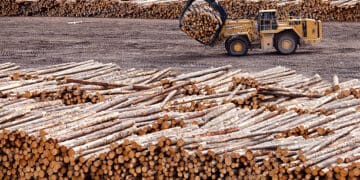The U.S. Department of Commerce has announced plans to increase tariffs on Canadian softwood lumber imports, a move that could escalate the longstanding trade dispute between the two nations. The Department’s preliminary assessment suggests raising the combined countervailing and anti-dumping duty rates from the current 8.05 percent to 13.86 percent for the majority of Canadian lumber producers.
International Trade Minister Mary Ng of Canada expressed significant disappointment over the United States’ decision to potentially heighten duties, emphasizing the negative impact on Canadian lumber exports. The proposed adjustments will not be uniform across all producers. For example, the preliminary tariff schedule indicates that Canfor Corp., based in Vancouver, could see tariffs rise to 15.79 percent from 6.61 percent. Similarly, tariffs for West Fraser Timber Co. Ltd. are expected to increase to 12.07 percent from 9.25 percent, J.D. Irving Ltd. could face an 11.03 percent rate up from 7.98 percent, and Tolko Industries Ltd. might see an increase to 16.76 percent from 8.05 percent.
These changes are part of the Commerce Department’s fifth administrative review, focusing on the lumber market activities in 2022, with final rates to be determined by August. The trade dispute, lacking a formal agreement since the expiration of the 2006 Canada-U.S. softwood agreement in 2015, intensified when the U.S. began imposing tariffs on Canadian lumber in 2017. The U.S. lumber industry contends that Canadian producers benefit from unfair subsidies and accuse them of dumping lumber into the U.S. market at below-market prices. However, Global Affairs Canada has highlighted that international panels have often ruled in Canada’s favor, recognizing it as a fair trading partner.
The core of the dispute lies in the differing nature of forest lands in the two countries, with U.S. industry representatives arguing that the Canadian system of provincial stumpage fees provides an unfair advantage to Canadian producers. In response to the proposed tariff increases, the U.S. Lumber Coalition has expressed support, citing the importance of enforcing trade laws against subsidized and unfairly traded imports. Conversely, Canadian officials and industry representatives argue that the duties are unwarranted and harmful to both consumers and producers across the border.
Canada has challenged the tariffs under the Canada-United States-Mexico Agreement dispute resolution process and filed a complaint with the World Trade Organization in 2017. The lumber market has experienced significant volatility in recent years, influenced by shifting demand patterns due to the COVID-19 pandemic and subsequent consumer spending trends on home improvement projects. According to Madison’s Lumber Reporter, cash prices for lumber have seen fluctuations, with the recent pricing for 1,000 board feet of lumber indicating a decrease from early 2022 but an increase from the previous year.
Stay current with supply chain report news at The Supply Chain Report. For international trade tools, see ADAMftd.com.
#USTariffs #CanadianLumber #TradeDispute #SoftwoodLumber #Canfor #WestFraserTimber #JDIrving #TolkoIndustries #CommerceDepartment #MaryNg #LumberPrices #TradeAgreements #USLumberCoalition #GlobalAffairsCanada #WTO #CUSTMA #TariffIncrease #TradeLaws #HomeImprovement #LumberMarket















